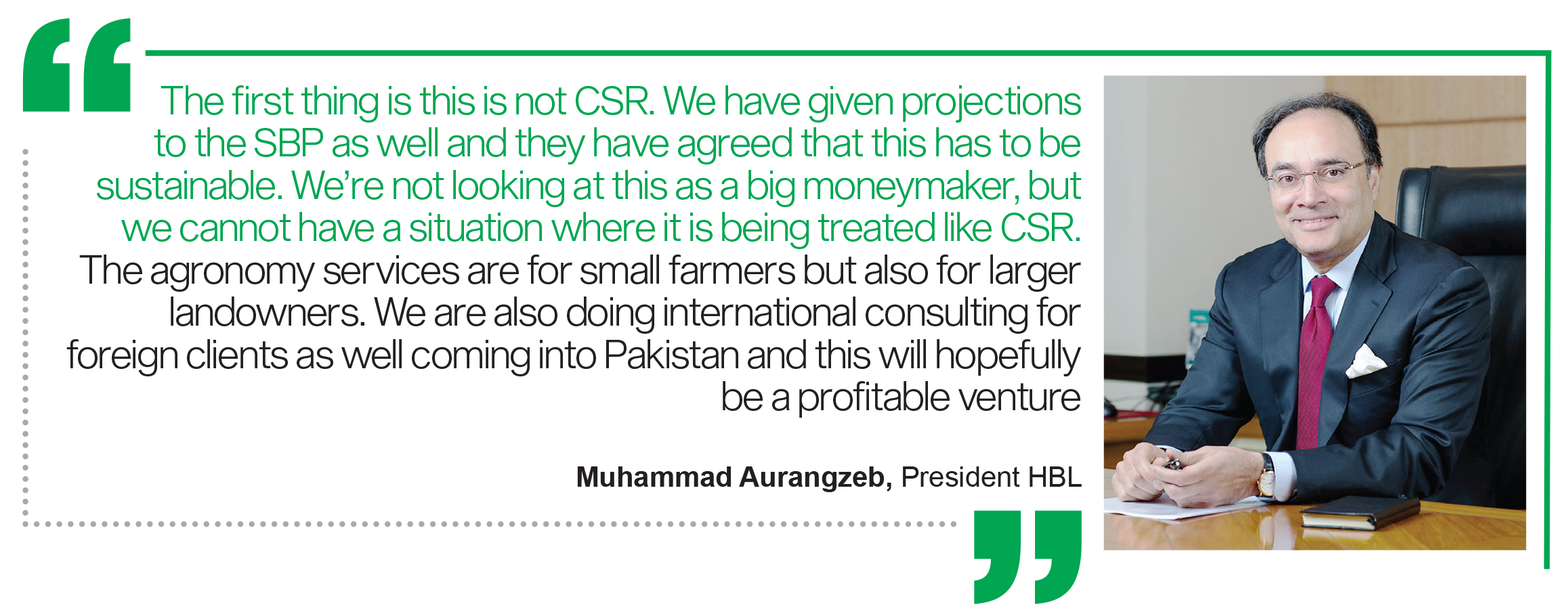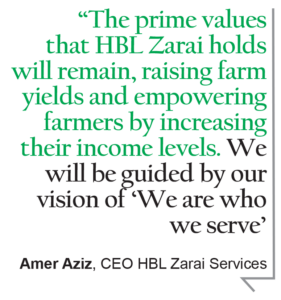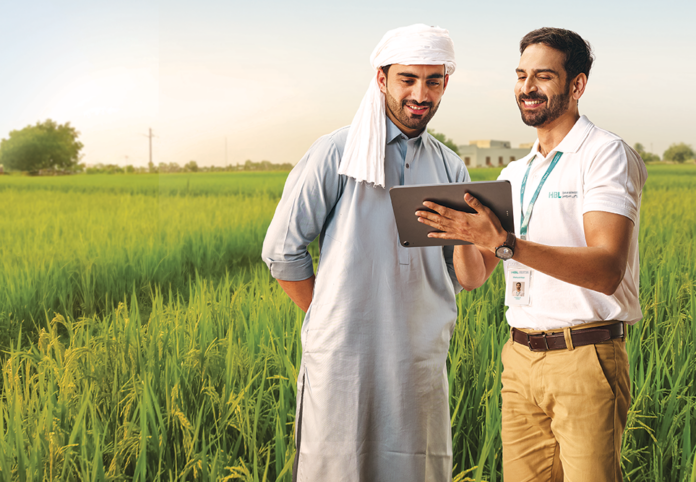Why is Pakistan’s largest bank about to get into the business of agriculture? And no, we aren’t talking about agricultural financing. We are talking about the bank opening a fully owned subsidiary whose function is providing facilities and services ranging from storage space and farming equipment to seeds, fertiliser, and agronomic advice.
Essentially, they are creating an agricultural consultancy that also doubles as a one-stop shop for the average farmer. But why now? HBL first announced their new company by the name of HBL Zarai back in July 2023. At the launch of their 2022-23 sustainability report, the bank’s President, Muhammad Aurangzeb, had received permission from the State Bank of Pakistan (SBP) to set up a special subsidiary to help small and medium-sized farmers improve their agricultural output.
The permission came as a bit of a surprise really. The central bank is nothing if not conservative, and this was the first time the SBP was granting permission to a bank to set up a fully owned subsidiary that was involved in a non-financial business.
And that is really what is so strange about HBL Zarai.

The company, while owned entirely by HBL, is a completely independent entity. That means this is not a corporate-social-responsibility gimmick, but a company with its very own balance sheet. The idea behind HBL Zarai is that it will promote good agricultural practices and help farmers at a time when HBL is trying to ramp up their lending towards the agricultural sector. The idea is solid. Agricultural lending in Pakistan has remained low despite it being the largest sector of the economy. The little lending that existed to the agricultural sector was largely unhelpful because it was based on collateral, with banks rarely putting in any effort to understand the needs of farmers and designing products specifically aimed towards them. HBL Zarai is supposed to be part of a move to understand and serve the sector.
But there is a catch. To really make this work, HBL will have to make sure that the new subsidiary is not reliant on the bank and can prove that it has good business fundamentals. This is the only way that other banks will follow suit. How do they plan on doing so? By their recently launched Deras set to be spread all across the country.
The lending problem
Agricultural financing in Pakistan has long been considered high-risk and has mostly been a collateral base. The issue has been that Pakistani banks have never really cared enough to try and understand agriculture. Think of it this way. Banks have branches in large cities. Over here, the business they get is for industries and other businesses that are more understood in urban centres. Meanwhile, there are very few bank branches in rural areas.
When a farmer walks into one of these rural branch offices looking for financing, they find there is very little leeway for what they can get. The bank might offer, for example, a loan that requires returning in 45 days. But this does not suit the farmer because his crop cannot be grown, harvested, and sold in the market in less than say 90 days. A loan under such conditions makes little sense for farmers. Adding on to this misery banks have often looked at farming and agriculture as a risky business. How will the bank collect its interest if a flood hits the crops or the weather means the yield is low? As a result of this most borrowing was based on skewed collateral.
All of this combined to mean that farmers, in particular smaller landowners, have not been able to access formal banking channels because they do not have much to put up as collateral, and also because bank repayment timelines are rarely catered to crop cycles.
As a result, lending to farmers remains low. In 2022 for example, according to a PWC study, allocation of loans to priority segments, namely Small and Medium Enterprises (SME) and Agriculture, has been relatively low, accounting for less than 8% of the total loans. Specifically, SME loans constitute 4.2% of the portfolio, while Agriculture loans account for 3.6%. Moreover, these penetration levels have been witnessing a decline over the past several years. This declining trend highlights the need for attention and support to bolster lending in these crucial sectors to foster their growth and development.

But this is a trend that has been changing now. There seems to be a realisation within banking circles that agriculture is a sector that needs to be serviced and brought into formal financial channels. Last year the agriculture sector saw a 27.5% growth in agri loans, after the agriculture lending financial institutions disbursed Rs 1.222 trillion on account of agricultural financing during the first nine months (July-March) of this fiscal year.
HBL has been a leader in these efforts. The bank’s agricultural portfolio in 2022 hit an all-time high of Rs 50.6 billion. This increase came after a lot of conscious introspection. Back in June 2023 when the bank released its sustainability report, its President, Muhammad Aurangzeb, told Profit that as a bank HBL had realised it had to do a better job in understanding this potential customer base of farmers and agriculturalists.
“We are going into this with a lot of clarity and detail about why we’re doing HBL Zarai. And we will appreciate it if other institutions also go in this direction,” he said. “As you’ve said, even HBL has been missing a trick up until this point. Why weren’t we in dairy and livestock farming? And by the way, the repayment capacity is okay. There isn’t a higher risk of default or anything. It is about understanding better,”
That is all well and good of course. HBL wants to increase their agricultural lending and to help the process along they have set up HBL Zarai — a company that will help farmers on their journeys. But what exactly is the plan to do so and how will the company work? According to the senior management at the bank and the new team of HBL Zarai, they will begin by taking their business directly to the farmers.
The HBL Zarai Dera
The 26th of February this year marked an important milestone in the history of Habib Bank Limited. It was the 20th anniversary of the bank’s privatisation. HBL was privatised back in 2004, when management control was handed over to the Aga Khan Fund for Economic Development (AKFED). One would have thought that the bank’s senior management would have marked the occasion at one of their new headquarters at Karachi, or their main office in Lahore, or perhaps at the iconic HBL Plaza on I I Chundrigar road out of a sense of nostalgia.
Instead, the bank’s President Muhammad Aurangzeb found himself at a brand new dera located in Burewala — a relatively small and agrarian Tehsil of the Vehari district in South Punjab. Known mostly for its most prodigal son, former Pakistan Captain Waqar Younus, Burewala has now become the location for the first HBL Zarai Dera in the country.
The dera itself is a red brick building with an office and an area to display farm machinery as well as storage space. “We could have had this launch at any of our offices. The reason for coming here is the same as why we’re doing this. We want to get into these villages and rural spaces and go to the farmers that might need help,” explains Muhammad Aurangzeb.
By providing access to essential resources and expertise, HBL Zarai Services aims to empower farmers and enhance productivity, efficiency, and profitability throughout the agriculture value chain. With a focus on sustainability and environmental stewardship, HBL Zarai Services seeks to promote responsible agricultural practices that ensure the long-term viability of farming communities and natural resources.
The business model
The goal from this point onwards, however, will be to scale HBL Zarai and make it a company that farmers can rely on. In an exclusive conversation with Profit, Muhammad Aurangzeb stressed that the company was not a CSR project and had to be based on strong business fundamentals.
“The first thing is this is not CSR. We have given projections to the SBP as well and they have agreed that this has to be sustainable. We’re not looking at this as a big moneymaker, but we cannot have a situation where it is being treated like CSR. The agronomy services are for small farmers but also for larger landowners. We are also doing international consulting for foreign clients as well coming into Pakistan and this will hopefully be a profitable venture.”

The indication is clear. The purpose behind HBL Zarai was to create a company that would aid in promoting agriculture in Pakistan and serve as a sort of respite house for small farmers. At the same time, the company needs to sustain itself and not become a burden for its parent company. It is a sentiment that was also echoed by Dr Inayat Hussain, the Deputy Governor of the SBP who was the chief guest at the launch of the Dera.
“We weren’t initially sure if a non-financial subsidiary should be established by a bank but we gave the go-ahead which was a first. I would hope that HBL Zarai becomes viable, credible, and reputable. HBL is the largest bank in Pakistan with a lot of resources. But for this initial step to have an impact other banks must follow suit; it cannot just be HBL. And since these other banks have fewer resources, they will have to feel that this sort of service is profitable. The reason we gave the permission is that we sense this can be profitable and this is what HBL must do.”
That is how Muhammad Aurangzeb and the team at HBL see the venture too. He indicated that HBL Zarai was ready to partner with anyone and was in fact also looking into certain projects with the Special Investment Facilitation Council (SIFC) which has taken a keen interest in the country’s agricultural sector. “We have gone to Pakpattan and Sahiwal. We are talking to Faisalabad Agricultural University which is going to give us five sites as well. We are already poised to work with the government of Punjab as well,” he told Profit in an exclusive sidelines chat.
“We have already been approached by the SIFC with the view that if they give us sites we will work with them as well. Our financing will continue on the HBL balance sheet. Even Zarai aside we are expanding by going into livestock and dairy for example. What will happen now is that there will now be more cash flow lending.”

On the occasion of the ceremony marking the launch of HBL Zarai, Sultan Ali Allana, Chairman – HBL said, “We have been actively pursuing programs and introducing solutions for the growth and progress of the Agricultural Sector since the privatisation of the bank in 2004. Al’Humdullilah HBL Group today is the single largest institutional provider of financial services for this segment of the economy directly impacting over 350,000 farmers. With the formation and launch of HBL Zarai, Insha’Allah, we will be able to host advisory and input services along with offtake and warehousing right at the farmers doorstep through Deras – dedicated distribution and service centres etched among the heart of the farmlands thus ensuring food security and income enhancement for the farming communities throughout the country.”
Amer Aziz, CEO – HBL Zarai Services stated, “This unique venture positions HBL to play a leading role in improving value chains across every economically significant sector, thus fostering sustainable agricultural practices and promoting food security nationwide. The prime values that HBL Zarai holds will remain, raising farm yields and empowering farmers by increasing their income levels. We will be guided by our vision of ‘We are who we serve’.”


























Innovation is the name of the game. HBL might have done wonders by bringing, implementing, successfully running and enhancing profitability by bringing different products in banking sector but their new venture( agriculture) is best amongst the lost. Pakistan is an agrarian economy. Govt owned banks can’t give services which are required for the promotion of agriculture for variety of reasons. They have their limitations, of skill know how, fear of losses, has set pattern given by resolution of legislature.
Private banks also has limitations but they definitely have the skill each and every case on its merit.
As per SBP deputy Governor Inayat Hussain Pakistan annually import more than 10 billion dollars food products that is burden on our foreign exchange reserves and one does hope that present decision of HBL to make subsidiary to help farmers in their efforts to strive reduce food import will play an important role achieving self sufficiency in food products.
Great initiative by HBL, ……..in the right direction………about time, banks devoted their resources to the backbone of the country’s economy……..
HBL should Focus on benefits to offer account holders and stop charging SMS alerts fees of Rs 200/- per month like other small banks with less stature than HBL being claiming largest bank with lot of resources HBL should follow banks who offer no SMS allert fee with fewer resources
Innovation is the name of the game. HBL might have done wonders by bringing, implementing, successfully running, and enhancing profitability by bringing different products in the banking sector but their new venture( agriculture) is best amongst the lost. Pakistan is an agrarian economy. Govt owned banks can’t give services that are required for the promotion of agriculture for variety of reasons. They have their limitations, of skill know-how, fear of losses, has set patterns given by resolution of the legislature.
As per SBP Deputy Governor Inayat Hussain Pakistan annually import more than 10 billion dollars in food products that is burden on our foreign exchange reserves and one does hope that the present decision of HBL to make a subsidiary to help farmers in their efforts to strive to reduce food import will play an important role achieving self sufficiency in food products.
You have done a great job.